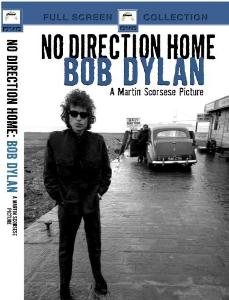No Direction Home
This article needs additional citations for verification. (October 2009) |
| No Direction Home | |
|---|---|
 | |
| Directed by | Martin Scorsese |
| Starring | Bob Dylan |
| Original language | English |
| Production | |
| Producers | Susan Lacy Jeff Rosen Martin Scorsese Nigel Sinclair Anthony Wall |
| Cinematography | Mustapha Barat |
| Editor | David Tedeschi |
| Running time | 208 minutes |
| Distributor | Paramount Pictures |
| Release | |
| Original release |
|
No Direction Home: Bob Dylan is a 2005 documentary film by Martin Scorsese that traces the life of Bob Dylan, and his impact on 20th-century American popular music and culture. The film focuses on the period between Dylan's arrival in New York in January 1961 and his "retirement" from touring following his motorcycle accident in July 1966. This period encapsulates Dylan's rise to fame as a folk singer and songwriter, and the controversy surrounding his move to a rock style of music. The title is taken from Dylan's 1965 single "Like a Rolling Stone".
Production and content[]
The film was first shown on television in both the United States (as part of the American Masters series on PBS) and the United Kingdom (as part of the Arena series on BBC Two) on September 26–27, 2005.[1] A DVD version of the film and accompanying soundtrack album (The Bootleg Series Vol. 7: No Direction Home: The Soundtrack) were released that same month.
The project began to take shape in 1995 when Dylan's manager, Jeff Rosen, began scheduling interviews with Dylan's friends and associates. Among those interviewed were poet Allen Ginsberg and folk musician Dave Van Ronk, both of whom died before the film was completed. Dylan's old girlfriend Suze Rotolo also granted a rare interview, and she later told Rolling Stone that she was very pleased with the project's results. Dylan himself also sat for ten hours in a relaxed and open conversation with Rosen in 2000. Other interviews with those who knew him at the time include Joan Baez, Pete Seeger, Liam Clancy, Maria Muldaur, Peter Yarrow and promoters like Harold Leventhal.[2]
According to Rolling Stone, an unnamed source close to the project claimed that Dylan had no involvement with the project apart from the interview, saying that "[Dylan] has no interest in this . . . Bob truly does not look back." However, work on the first installment of Dylan's autobiography, Chronicles, Vol. 1, did overlap production of the project, though it is unclear how much, if any, influence Chronicles may have had on No Direction Home.
Though raw material was being gathered for the project, Rosen needed someone to edit and shape it into a quality motion picture, and celebrated filmmaker Martin Scorsese was approached to direct the documentary planned from the project. Scorsese eventually agreed and came aboard in 2001.
In the meantime, Dylan's offices gathered hundreds of hours of historical film footage dating from the time covered in No Direction Home. These included a scratchy recording of Dylan's high school rock band, his 1965 screen test for Andy Warhol, and newly discovered footage of the famous Manchester Free Trade Hall concert from May 17, 1966, when an angry fan called out "Judas!" just before Dylan and The Hawks performed "Like a Rolling Stone." Shot by D.A. Pennebaker, the onstage color footage was found in 2004 in a pile of water-damaged film recovered from Dylan's vault.
The cover photo on the DVD package, by Barry Feinstein, shows Dylan standing in front of the Aust Ferry terminal in Gloucestershire, England, in May 1966, shortly before the opening of the Severn Bridge which replaced the ferry.
Reception and awards[]
The film received positive reviews from film critics, as review aggregate website Rotten Tomatoes reported that 88% of critics gave the film positive reviews, based on 14 reviews.[3] Critic Roger Ebert gave the film four out of a possible four stars, stating that it "creates a portrait that is deep, sympathetic, perceptive and yet finally leaves Dylan shrouded in mystery, which is where he properly lives".[4] The film received a Peabody Award in April 2006[5] and a Columbia-duPont Award in January 2007,[6] and Martin Scorsese received a Grammy Award in direction for best long-form video.
Legacy[]
The documentary, describing the 1960 New York folk scene, served as an inspiration to Justin Timberlake for his part in the Coen brothers' related drama Inside Llewyn Davis (2013).[7] Scorsese would make a second documentary on Dylan fourteen years later, Rolling Thunder Revue: A Bob Dylan Story by Martin Scorsese (2019), this time chronicling his 1975 Rolling Thunder Revue concert tour.
References[]
- No Direction Home: The Life and Music of Bob Dylan, Robert Shelton, 1986, Da Capo Press reprint 2003, ISBN 0-306-81287-8
- ^ "Bob Dylan About the Film".
- ^ Ebert, Roger. "No Direction Home: Bob Dylan". RogerEbert.com. Retrieved 8 July 2016.
- ^ "No Direction Home". Rotten Tomatoes. Retrieved 2009-10-07.
- ^ Ebert, Roger (2005-09-20). "No Direction Home: Bob Dylan". Chicago Sun-Times. Retrieved 2009-10-07.
- ^ 65th Annual Peabody Awards, May 2006.
- ^ "Past duPont Award Winners". The Journalism School, Columbia University. 2007. Archived from the original on November 23, 2008. Retrieved September 7, 2008.
- ^ Hirschorn, Michael (September 12, 2013). "The Enduring, Multigenerational Appeal of Justin Timberlake". T Magazine. Retrieved August 12, 2015.
External links[]
- No Direction Home: Bob Dylan – A Martin Scorsese Picture at IMDb
- No Direction Home at Rotten Tomatoes
- No Direction Home at bbc.co.uk.
- 2005 television films
- 2005 films
- 2005 documentary films
- BBC television documentaries
- American Masters films
- Films directed by Martin Scorsese
- Rockumentaries
- Peabody Award-winning broadcasts
- Films about Bob Dylan
- Grammy Award for Best Long Form Music Video
- Films produced by Martin Scorsese